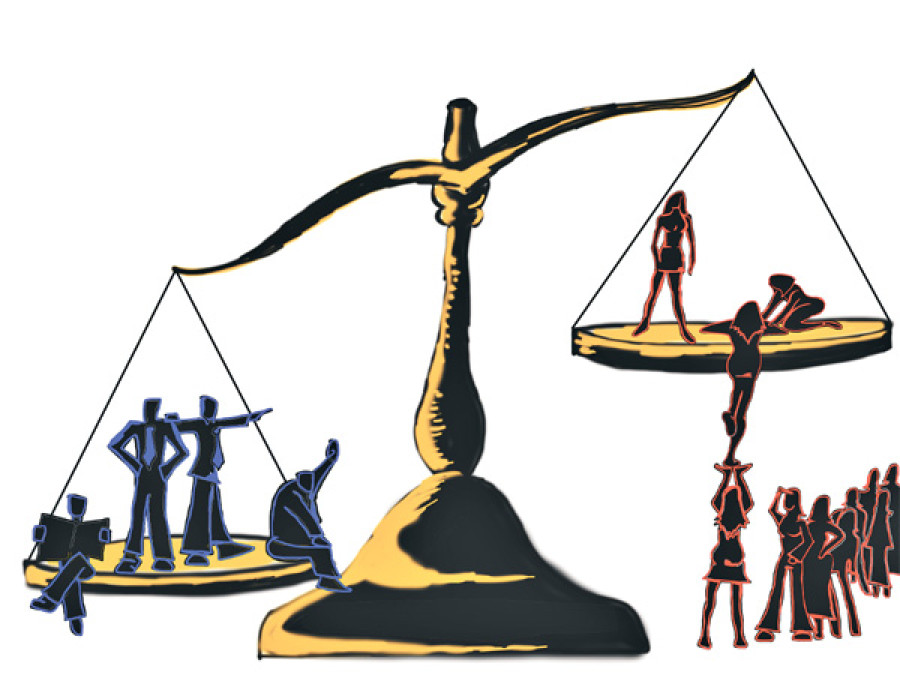Opinion
Power parity
The next president of Nepal should be a woman
Prativa Sapkota
Recently, the democratic US presidential candidate Hillary Rodham Clinton addressed thousands of people at a rally, expressing her desire for a country “where a father can tell his daughter: yes, you can be anything you want to be, even President of the United States.”
It is well known that discrimination based on gender, is not a local or regional issue, but a global concern and one of the most studied social issues in the last few decades. While such discrimination is recognised and widespread—even the US is yet to elect the first female president—we should nonetheless begin a serious discussion about where we see our nation’s future and how we plan to go beyond the current repressive politics of gender. Reservations to actualise gender inclusive policies are based on false assumptions that women are less competent than men. But unless we take progressive steps to address gender inequality, Nepal will fall behind the rest of the world in building an inclusive society. It is now more imperative than ever to genuinely institutionalise gender inclusion in Nepal. This could begin with genuine aspirations to place a woman at our nation’s highest office. By focusing on a position that is largely ceremonial, I do not intend to diminish the efforts of those who are fighting for women’s equality in the current constitution. It is indeed shameful that the debate on electing a female prime minister in Nepal is yet to even begin.
Mainstreaming gender
There is a need to seriously consider having a female president of Nepal. First, it is critical that we recognise women’s contribution to the social and national fabric of Nepal. When there are discussions on altering the political paradigm and the ruling class in Nepal, current narratives frequently undermine women’s involvement in political movements. So, it is high time to acknowledge women’s sacrifice by considering them for a lead position in the bureaucracy such as the post of the president of Nepal.
Second, let us shape our political institutions in line with our perception of Nepal as a modern, educated, and civilised nation. Our lack of action against the traditional fabric of political backward structures supports the preconceived notion of male dominance. This can be dismantled by only questioning and resisting existing discrimination in society. Making policies that recognises people’s unequal status based on gender is not enough, unless it is realised in practice as well. Changes in policies have only been limited to symbolic gestures so far and as a result have reinforced the status quo.
Third, genuine efforts need to be made for gender equality. Most of the changes made in Nepal’s policies, which recognise gender-based inequality, have been made either through donor influence or extraneous pressure. While we like to claim such progressive changes as our own, no genuine efforts have been made until now to put such policies into practice.
Time to change
Appointing a first female president will inspire thousands of girls, who could potentially be our future leaders. Witnessing women in important political positions will further inspire those who still consider such high ambitions to be unattainable due to their gender.
Last but not the least, it is shameful that our political structures still treat women as second-class citizens. Unequal clauses in the new constitution for men and women for issuing citizenship are being justified by evoking Nepal’s geo-political complexities with its neighbours. Women are made to believe that this sacrifice of female citizens will save the sovereignty of our nation. Thus, male chauvinism is prevalent in contemporary Nepali politics. Let us rectify this by making a genuine effort to mainstream gender in politics, because anything else would be detrimental to our nation’s sovereignty.
There are no legitimate reasons not to appoint a woman as the next president of Nepal. With due acknowledgement that political representation is a complex process that involves multiple considerations, we need to emphasise that it is a myth that women are not as competent as men. Such notions equate masculinity with power. This is detrimental to the inherent power of women as it regressively expects masculine tropes as the standard behaviour of those that rule. We must redefine the standard behaviour expected of women rather than seeking masculine traits in women as a symbol of power. Only then it will be possible for a Nepali father to tell his daughter, “Yes, you can be anything you want to be, even the president of Nepal.”
Sapkota is a PhD student at the University of Melbourne




 17.9°C Kathmandu
17.9°C Kathmandu











